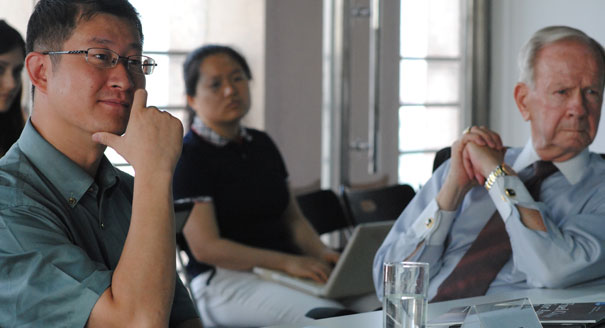{
"authors": [
"Wang Tao",
"Gal Luft",
"Robert McFarlane",
"Anne Korin"
],
"type": "event",
"centerAffiliationAll": "",
"centers": [
"Carnegie Endowment for International Peace",
"Carnegie China"
],
"collections": [
"China’s Foreign Relations",
"U.S.-China Relations"
],
"englishNewsletterAll": "",
"nonEnglishNewsletterAll": "",
"primaryCenter": "Carnegie China",
"programAffiliation": "",
"programs": [],
"projects": [],
"regions": [
"East Asia",
"China"
],
"topics": [
"Climate Change"
]
}
China-U.S. Cooperation on Energy Issues
Wed, June 18th, 2014
Beijing
As China’s energy demand continues to rise, cooperation between China and the United States is crucial to the security of both countries’ energy supplies. Rising incomes and increased migration to China’s large cities has caused China’s energy demand to grow rapidly. Carnegie–Tsinghua’s Wang Tao hosted a panel of experts from the Institute for the Analysis of Global Security, China University of Petroleum, and Beijing Foreign Studies University to discuss opportunities for energy cooperation between Beijing and Washington.
Discussion Highlights
- Collaboration Opportunities: According to the Institute for the Analysis of Global Security’s annual report, China and the United States have great potential for cooperation on energy issues related to transport, petroleum, and natural gas, panelists said. Currently, the transportation fuel market is dominated by oil. A shift toward natural gas would help both countries’ growing energy needs, a panelist explained.
- Transport Demand Rising in China: Panelists agreed that as income rises in China, the demand for transportation also rises. Higher income ushers in a greater demand for private vehicles. Furthermore, as more people move into China’s largest cities, the demand for public transportation and more integrated transportation networks will rise as well.
- Future of Methanol: Panelists argued that methanol is cheaper and a more environmentally friendly fuel source. While exporting liquefied natural gas has many restrictions, methanol is fairly easy and inexpensive to convert from natural gas and then export. A panelist suggested that China should invest in U.S. methanol plants, which would be a win-win as much of the methanol would be exported back to China.
- Electric and Hybrid Vehicles: Currently, there are few incentives for people in China to buy electric or hybrid vehicles. A Chinese panelist explained that because electric cars have limited storage capacity, they are less appealing to potential consumers than conventional fuel-powered models. There are also restrictions on installing electric car charging stations, which makes electric vehicles an even less practical mode of transportation.
Discussants Included: Xie Tao, Qi Zhang
Carnegie does not take institutional positions on public policy issues; the views represented herein are those of the author(s) and do not necessarily reflect the views of Carnegie, its staff, or its trustees.
